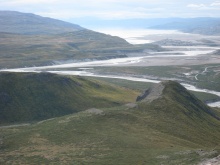SEDIBUD 2008: Difference between revisions
From CSDMS
m all text edits for SediBUd |
mNo edit summary |
||
| Line 73: | Line 73: | ||
|- | |- | ||
| class="presentations_col1"| Jeff Warburton | | class="presentations_col1"| Jeff Warburton | ||
| class="presentations_col2"| | | class="presentations_col2"| Peaty Rivers and Carbon budgets | ||
| class="presentations_col3"| [[media:JeffWarburton.pdf|pdf]] | | class="presentations_col3"| [[media:JeffWarburton.pdf|pdf]] | ||
|- | |- | ||
| Line 85: | Line 85: | ||
|- | |- | ||
| class="presentations_col1"| Ted Lewis | | class="presentations_col1"| Ted Lewis | ||
| class="presentations_col2"| Sediment | | class="presentations_col2"| Sediment transport and disturbances | ||
| class="presentations_col3"| [[media:TedLewis.pdf|pdf]] | | class="presentations_col3"| [[media:TedLewis.pdf|pdf]] | ||
|- | |- | ||
Revision as of 16:40, 15 September 2008
SEDIBUD workshop, September 9 - 13, 2008
| Date: September 9 to 13, 2008 | 
|
| Location: Boulder, Colorado, USA | |
| Host: INSTAAR, Mountain research station, CO | |
Organizers:
<properties>
Achim A. Beylich:=Achim.Beylich@ngu.no
Scott F. Lamoureux:=lamoureu@post.queensu.ca
Armelle Decaulne:=armelle.sedibud@gmail.com
Nel Caine: =Cainen@colorado.edu
Irina Overeem: =Irina.Overeem@colorado.edu
</properties>
Website:
http://www.geomorph.org/wg/wgsb.html
Sponsors:
International Association of Geomorphologists (IAG)
Community Surface Dynamics Modeling System (CSDMS)
Goals:
- Climate change affects all Earth surface systems but with the arguably greatest impact in high-latitude and high-altitude cold environments. In these areas, climate change shapes earth surface processes not just by altering vegetation cover and human activities but also through its impact on frost penetration and duration within the ground surface layers. All of these factors influence patterns of erosion, transport and deposition of sediments and related fluxes (e.g., nutrients, solutes, carbon). It is a challenge to develop a better understanding of how these factors combine to affect sedimentary transfer processes and sediment budgets in cold environments. Our baseline knowledge on the erosion, sedimentary transfer and depositional processes operating within Holocene and present-day climates and as landscape systems evolved and under given vegetation covers, forms our basis for predicting the consequences of predicted future climate change and related vegetation cover changes. However, much of this information is limited in terms of spatial and temporal coverage and needs to be extended and consolidated. Only when we have these reliable models response to landscape and climate change we will have fuller understanding of probable future changes to these regions.
- Central issues will be the further discussion of relevant science questions to be addressed within the SEDIBUD programme, the presentation and further discussion of the SEDIFLUX Manual (Revised Version), the presentation of SEDIBUD key test sites (catchments), the development of the SEDIBUD metadata database, and the development of further ideas to continue and to extend the scientific activities within SEDIBUD.
Program and Abstract Volume:
The final program and abstract volume pdf (July, 2008)
Talks:
| Presented by | Title | Download |
|---|
| James Syvitski | CSDMS introduction | |
| Armelle Decaulne | Debris Flows in Iceland | |
| Thorsteinn Saemundsson | 2007 Morsarjokull Rockfall | |
| Achim Beylich | Erdalen Sediment Budget | |
| Irina Overeem | Arctic River Budgets | |
| Katja Laute | Erdalen braidplain budget | |
| Jeff Warburton | Peaty Rivers and Carbon budgets | |
| Richard Johnson | Landslide budgets over time | |
| Jukka Kayhko | Changing Catchments in Finland | |
| Ted Lewis | Sediment transport and disturbances | |
| Helgi Jonnson | Rockslides in Iceland | |
| Colin Thorn | New dating techniques for Paleosols | |
| John Dixon | Geochemical budgets in Cold Climates | |
| Ole Saether | Natural Organic Matter in Subalpine Catchments |
